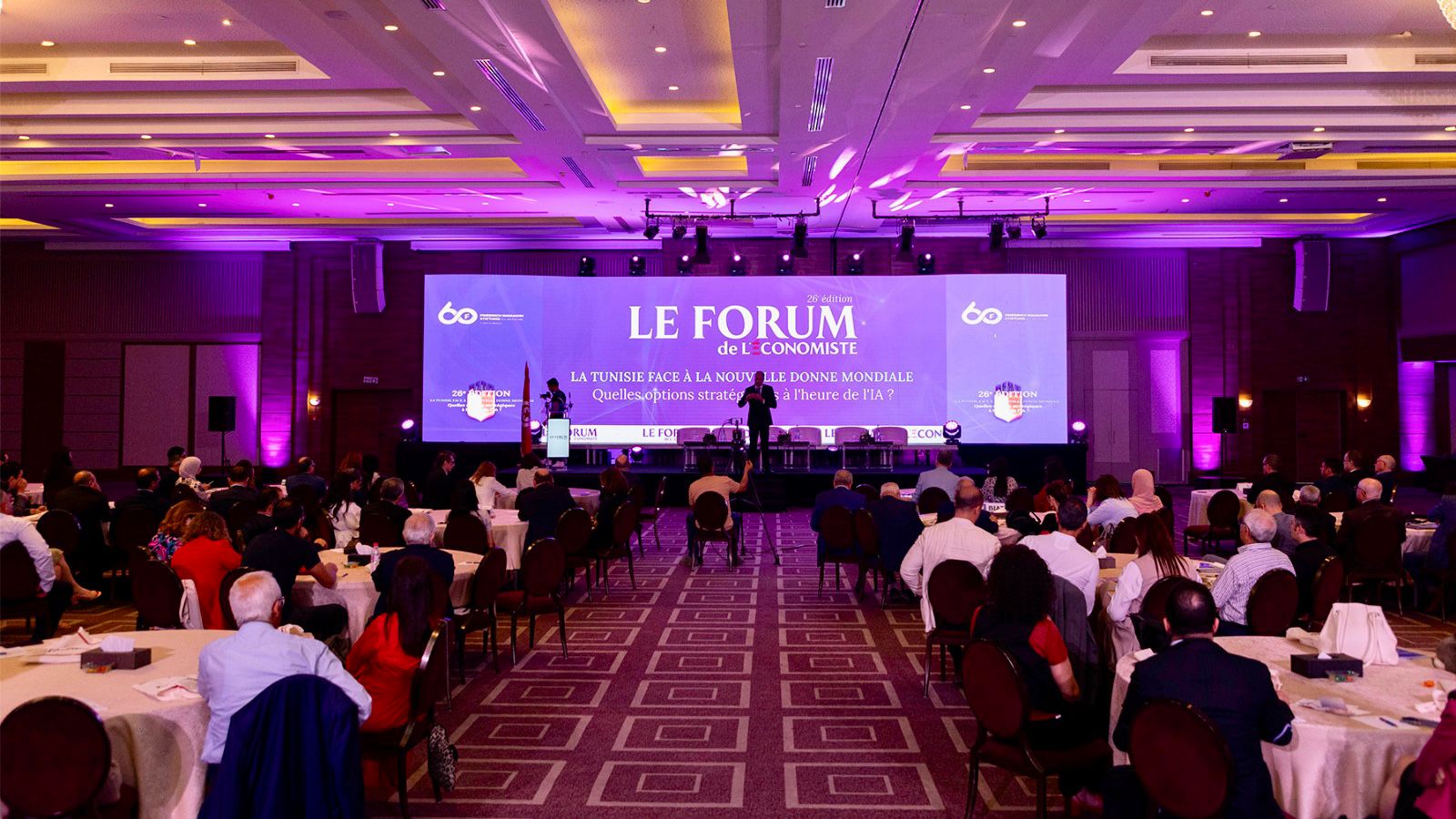AI and Tunisia: A Strategic Shift
International Forum of L’Économiste Maghrébin

Repositioning Tunisia in a Changing World: The 26th edition of Forum of L’Économiste Maghrébin Embraces AI and Strategic Partnerships
Tunis, May 20, 2025, the 26th edition of the International Forum of L’Économiste Maghrébin marked a defining moment in Tunisia’s economic dialogue, spotlighting the transformative potential of Artificial Intelligence (AI) in a rapidly shifting global landscape. This year’s forum carried the theme: “Tunisia in the New Global Order: What Strategic Options in the Age of Artificial Intelligence?”
A Strategic Pivot Toward AI and Europe
The central idea that shaped the forum’s discussions was the urgency of building a renewed partnership between Tunisia and the European Union, one centered on the strategic opportunities presented by AI. Mr. Hédi Méchri, Director of Publications at L’Économiste Maghrébin, framed the forum’s focus in light of growing geopolitical shifts and the global acceleration of technological innovation. According to him, the integration of AI into Tunisia’s economic framework is no longer optional it is essential to remain competitive and agile in international value chains.
He argued that AI can become the lever that drives the modernization of Tunisia’s economy, impacting not just industrial processes but also consumption patterns, healthcare delivery, transportation, and financial services. "There is no better response to global geopolitical upheavals than unity. And there is no time to waste if we want to open a new industrial chapter rooted in innovation and responsibility," he said.
High-Level Panels and Sector-Specific Case Studies
The forum’s rich programming included high-level panels exploring how AI is reshaping key sectors such as pharmaceuticals, automotive manufacturing, and financial engineering. In a panel titled "AI and Pharma," several success stories demonstrated how the digitalization of pharmaceutical operations is already underway in Tunisia.
Mr. Fares Messedi, CEO of Saydalid a cloud-based pharmacy management platform highlighted how AI can optimize inventory and improve patient service. He noted that the traditional expertise of pharmacists, while still essential, needs to be augmented by technology for faster and more precise operations.
Mr. Mohamed Amine Boujbel, CEO of Neapolis Pharma, shared how AI reduced order processing time from an hour to just 30 seconds in his company. By investing in R&D partnerships with universities, Neapolis is bridging academic research and industrial innovation. Meanwhile, Swiss-based researcher Idris Bachali Losada emphasized the role of AI in precision medicine, noting that predictive analytics could allow for more targeted therapies and even preventative interventions.
A Breakthrough in Networking: The B2B Revolution
In a notable first, the 2025 forum introduced a structured B2B matchmaking platform, revolutionizing how participants engaged with one another. More than 70 participants from over 40 companies took part in 130 pre-scheduled business meetings throughout the day. Powered by a smart digital interface, attendees were able to plan their agendas, select relevant sectors, and connect with potential partners in a highly efficient format.
This B2B component was widely praised for its effectiveness. Mr. Mahdi Bouzaiane, Executive Director of Siryos, called the initiative a “high-value exchange platform” that fostered collaboration between startups, integrators, and technology providers. Amine Ben Hmida, CEO of Business Room, lauded the forum’s organization and confirmed he identified several promising contacts. For Ms. Inès Haffi, CEO of Arsela Technologies, the B2B sessions were a “game-changer” in forging quick and impactful connections.
Participants reported that the meetings condensed months of prospecting into a single day, unlocking significant business and commercial potential especially valuable given the usual costs and uncertainty associated with international travel for such networking.
Tunisia’s Role in the AI-Driven Global Economy
Across panels and networking sessions, a consensus emerged: Tunisia holds strong potential to become a regional AI and pharmaceutical innovation hub provided key barriers such as regulatory frameworks and foreign exchange policies are addressed. The forum concluded with calls for bold action, solidarity, and visionary leadership to ensure that Tunisia does not merely adapt to the global digital shift, but becomes an active architect of its future.
To sum up, the 26th Forum of L’Économiste Maghrébin was not just another annual event it was a strategic inflection point. By embracing AI, fostering Euro-Tunisian partnerships, and introducing a cutting-edge B2B networking model, the forum positioned itself as both a think tank and a business incubator. Tunisia’s path forward may be challenging, but with the right tools and mindset, it can also be transformative.
